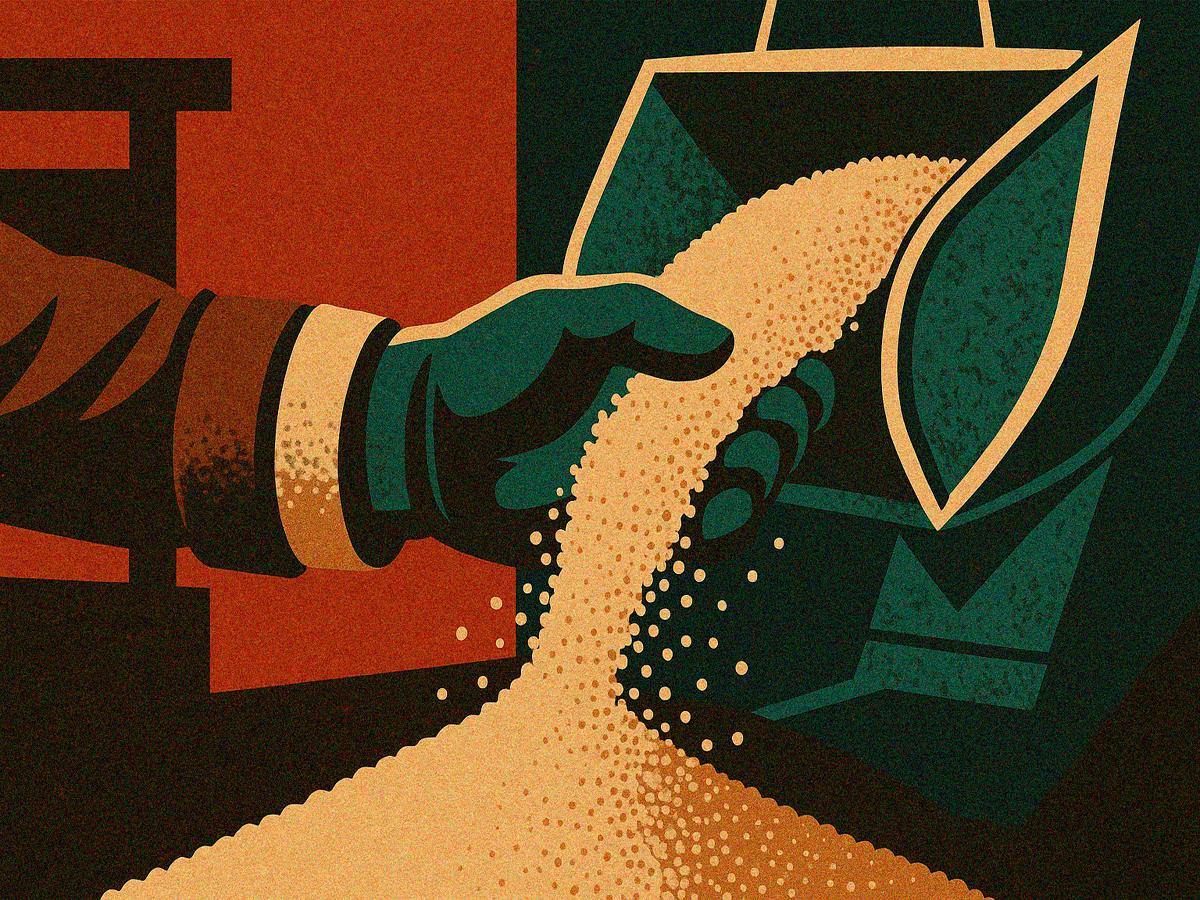An investigation by the BIC has revealed that private companies linked to Alexander Lukashenko's inner circle are profiting from the circumvention of sanctions against Grodno Azot, one of the largest state-owned enterprises in Belarus, which employs around 7,000 people. The key points are as follows:
- Following the imposition of EU sanctions in 2021, the plant established a scheme to continue exports through the state-owned company Grikom with a minimal markup of around 1%.
- In 2022, private intermediaries emerged, one of them was Technospetstrading. This company is managed by Armen Harutyunyan, who is a business partner of Lukashenko's associate, Sergei Teterin. This company took from 19% to 31% of the Grodno Azot selling price.
- In 2024, new intermediary firms associated with Lukashenko's son, Dmitry, and other close associates joined. Their final price can be 70% higher than the selling price of Grodno Azot.
- This money is used to purchase luxury cars (including Rolls-Royces) and expensive phones, and is issued as 'loans' in order to avoid paying taxes.
- According to BIC estimates, the services of private intermediary companies could cost Grodno Azot more than $35 million in 2024, with total exports to the EU amounting to $59 million.
- This scheme not only circumvents sanctions, but also transfers profits abroad through foreign shell companies. This results in significant losses for the state-owned enterprise and the Belarusian budget.
Thus, the sanctions, which were intended to influence the Lukashenko regime, have in fact become a source of enrichment for his associates while hindering the development of Grodno Azot.
Proxies of Lukashenko’s sanctioned “wallets” continue creative efforts to bypass sanctions against Grodno Azot - Belarus’ monopoly producer of nitrogen fertilisers, making earning up to EUR 60 million revenue in 2024 with mark ups of up to 50%, while still leaving some profit for the sanctioned state owned enterprise. The evaders’ mark ups of up to 170 EUR per ton dwarf EU’s newly introduced import duties against Belarusian and Russian nitrogen fertilisers (EUR 40/t). The evasion chain includes EU-based companies owned by proxies of Lukashenko’s sanctioned “wallets”, who continue to run their business in Poland and Estonia in spite of double violation of EU sanctions.
Straw companies were established to circumvent EU sanctions against Grodno Azot. They made the state-owned producer of nitrogen compounds with about 7000 employees a great source for private profits.
The Belarusian Investigative Center (BIC) prepared this piece with the support of the labor activist group Rabochy Ruch and Polish newspaper Dziennik Gazeta Prawna. This is the second part of the investigation into the sanctions-evasion scheme by the Grodno Azot enterprise. In the first part we talked about two of the routes used in the scheme — through Poland and Latvia.
Grikom: a state intermediary
In December 2021 the European Union added one of the largest Belarusian industrial enterprises Grodno Azot to its sanctions list. The European Council noted that Grodno Azot was “supporting the Lukashenka regime”, “benefiting from the Lukashenka regime” and “responsible for the repression of civil society” because its workers “who participated in peaceful protests against the regime and went on strike, were dismissed, intimidated and threatened both by the Grodno Azot management and regime representatives.”
To continue exports to the European Union, the Hrodna (Grodno) district executive committee established the Gosudarstvennoe predpriyatie Grikom (State Enterprise Grikom). Officially it was an “independent manufacturer” of nitrogen compounds, but in reality it resold nitrogen fertilisers produced by Grodno Azot.
Viktar Rusak, former head of the personnel department at Grodno Azot, became the director of the new company. [*] [*] During the 2020 presidential elections in Belarus Rusak headed the election commission at a polling station located within the Grodno Azot dormitory. The official election result at the station was more than 66% of the vote for Aleksandr Lukashenko, which was much higher than the numbers published by independent observers.
Grikom was the first supplier known to us of the Belarusian nitrogen fertilisers to the EU after the sanctions were introduced. This enterprise was already mentioned in other BIC investigations: How Belarusian fertilizer company get banned nitrogen into Europe through straw companies and
How Uzbekistan assists Belarus in bypassing bans and selling fertilisers from a sanctioned enterprise to the EU. The services of this intermediary company were quite cheap — no more than 1% of the selling price of nitrogen fertilisers, sometimes even less than 0.2%. [*] [*]
The state-owned Belneftekhim concern, which includes Grodno Azot, explained in a note to the Council of Ministers of Belarus that intermediary companies were needed "to overcome the sanctions restrictions". They were called special exporters. The document also states that a special exporter should earn a minimum — "to cover logistics costs and to carry out current financial and economic activities". [*] However, 2022 brought new opportunities and some new players with huge appetites appeared.
Friend of my friend is my friend
The full-scale Russian war against Ukraine dramatically drove up gas prices in Europe, while Belarus still received the Russian gas at a low price. Natural gas is one of the main components needed to produce nitrogen fertilisers. Therefore, Belarusian nitrogen compounds became highly competitive.
In the late summer of 2022 the private company OOO Technospetstrading (Technospetstrading limited liability company) offered its services in evading sanctions. The BIC has the minutes of meetings between the management of Grodno Azot and representatives of Technospetstrading. Within a month the new player was added to the scheme. [*] [*] The actual owner of Technospetstrading (via another person) is Armen Harutyunyan, an Armenian citizen and a former business partner of Sergei Teterin (Siarhei Tsiatseryn) . Teterin belongs to Lukashenko's inner circle and he has been on the EU sanctions list since June 2021. [*] [*] [*] [*] [*]
As with Grikom, Technospetstrading was an «independent manufacturer» on paper only. In reality its exports are produced at the same facilities, using the same equipment and the same Grodno Azot workforce as before. However, unlike the 1% usually taken by Grikom, Technospetstrading took from 19% to 31% of the Grodno Azot selling price.
In spite of the Belneftekhim guidelines requiring that the sanctions-evading intermediaries be only assigned a profit enough to cover its expenses, Technospetstrading has a number of luxury cars in its garage – among them BMW X5, Mercedes GLC, two BMW 750, sports car BMW M3. The diamond of its collection is Rolls-Royce Ghost. [*] [*] [*] In 2022–2023, the company issued private loans for more than 4 million Belarusian rubles (more than 1 million euros) to its beneficiary Armen Harutyunyan, to its director Dmitriy Goshko (Dzmitry Hoshka) and to structures connected to these people. [*]
Businessman and blogger Alexandr Knyrovich said in a comment to the BIC that the managers of Technospetstrading could use these loans to avoid paying taxes:
"Usually, such loans are given when a company cannot pay dividends or when the dividends are considered to be very expensive. Because when you pay dividends, you must first pay VAT in full, then show income, then show income tax, then show tax on dividends, and only after that can you receive real money into your account. In the case of loans, you do not need to follow this scheme. The only thing is that, of course, recently you have to give 13% to the state. But then, when you repay the loan, you have the right to set it off, this 13%. ... The law does not set any specific deadline for repaying this loan, especially to your own enterprise. Even if it is written on paper: for one year, for two, for five. This term can be extended virtually indefinitely, for example, by the founders. And you are basically these founders.”
In addition, this scheme can help in hiding extremely high salaries, as such salaries might displease Aleksandr Lukashenko, added Knyrovich.
Selling to himself
Some of the foreign companies that purchase nitrogen fertilisers from Technospetstrading (for example, Dubai's World Chem Trading or Poland's TST PL sp. z o.o.) also belong to Armen Harutyunyan. [*] [*] Harutyunyan's foreign companies resell the fertilisers to EU buyers. According to the accounts provided to BIC by members of the Rabochy Ruch initiative, this gives Harutyunyan's private companies an additional 17-30% of the selling price. As a result, the profit of approximately $140 per ton goes to the accounts of Harutyunyan's companies and not to the coffers of the state-owned Grodno Azot.
When Grodno Azot worked with Grikom, the state-owned intermediary, it sold urea to the EU at €350-380 per ton, which is roughly the market price. With the private intermediary Technospetstrading, Grodno Azot receives only €236 per ton, although the market price has remained almost the same.
More of Lukashenko’s cronies
In 2024 several more straw companies were added to the scheme for circumventing the EU sanctions. On the Belarusian side, supplies are controlled by people close to Dmitri (Dmitry) Lukashenko (the middle son of Aleksandr Lukashenko), and Mikalai Varabei (Nikolay Vorobey), Lukashenko's crony in oil trade. Foreign straw companies were registered in the names of people from the entourage of Viktar (Viktor) Sheiman, Lukashenko's closest associate.
Among the Belarusian companies was OOO MetaTradingProm (MetaTradingProm limited liability company). It is owned by three people: Andrei Karpovich, the former executive director of the Presidential Sports Club, which is run by Dmitri Lukashenko; Sergei Puzevich, associated with Mikalai Varabei; and Aleh Aliokhin (Oleg Alekhin), a former manager at Grodno Azot. [*] [*] MetaTradingProm uses the same scheme as Technospetstrading: they sell nitrogen fertilisers abroad to straw companies who resell them to real clients. The final price can be 70% higher than the selling price of Grodno Azot — BIC investigators found at least one such shipment.
One of the EU companies that buys Belarusian fertilisers from MetaTradingProm is the Polish company Aliansgroup sp. z o.o.. Among its co-founders is Andrei Lyndou who also owns several companies in Belarus. One of those has Lukashenko's former bodyguard Aliaksandr Ramanouski (Aleksandr Romanovsky) as a beneficiary. [*] [*]
In late 2024 – early 2025 Poland sanctioned the intermediary Belarusian companies that had exported Grodno Azot products, and now Latvia is the main trade route for the scheme. The BIC journalists got access to one of the contracts that cover this new route. The German company Bauer Blue GmbH buys urea via the Estonian company Stacroloft INC. OÜ. [*] The owner of Stacroloft is Sergej Nemirovski whose father-in-law Mikhail Tsyplakov worked with Viktar Sheiman. Tsyplakov held the position of deputy general director of the state company Belzarubezhhandal, which exported petroleum products under Sheiman's leadership. [*]
Sheiman also has connections to the Cyprus-registered company Rostumel Holding Limited. Rostumel Holding Limited had been buying Grodno Azot products via MetaTradingProm and reselling them in the EU. [*] On December 31, 2024, Rostumel Holding Limited fell under Polish sanctions. This company was mentioned in another BIC investigation into the circumvention of sanctions involving potash fertilisers and luxury cars.
Andrei Svirydau, Sheiman's former deputy at the Presidential Affairs Department, is the financial director at Rostumel Holding Limited. BIC journalists reached Svirydau on the phone, but he cut the conversation short as soon as he heard the topic.
Conflict between «straw companies»
In 2023 tax inspectors found a large underpayment of taxes by Technospetstrading, including taxes on its Rolls-Royce. Some of the former Technospetstrading clients started working with MetaTradingProm. The director of Technospetstrading Dmitriy Goshko wrote to Aleksandr Lukashenko accusing MetaTradingProm of fraud:
"Deputy General Director for Commercial Affairs (Grodno Azot) Strechan A.A., deliberately misleading the General Director of the plant, brought a fraudulent structure (group of companies) to the plant, allegedly to increase export volumes to the EU with their help ... there is a Cypriot company Rostumel, which has no idea about the sale of nitrogen fertilisers ... Rostumel Holding Limited is nothing more than a straw company, which absorbs the profits illegally withdrawn from the Republic of Belarus... This means that we have the fact of withdrawing all profits outside the Republic of Belarus in order not to pay taxes here." [*] [*] [*] [*]
Dmitriy Goshko described the scheme that allowed his competitors to put money into foreign accounts and to avoid paying taxes in Belarus. However, he failed to mention that he and the Technospetstrading beneficiary Armen Harutyunyan had organized a similar scheme earlier and were still using it.
It is not clear whether Lukashenko read Goshko's letter and if so, what was his response. However, both Technospetstrading and MetaTradingProm continued their work as of 2025.
Who benefits from Grodno Azot losses?
BIC journalists tried to obtain a comment from Grodno Azot representatives about the situation when the enterprise loses a large part of its potential profits. Deputy General Director Aliaksei Strechan (Aleksei Strechen) answered the phone call, but refused to provide any comment to the BIC.
According to the BIC calculations, the services of private intermediary companies could cost Grodno Azot more than $35 million in 2024. In the same year Grodno Azot received $59 million for its exports to the European Union.
These numbers show who was the real beneficiary of the scheme to circumvent EU sanctions. “The special exporters” were supposed to help the state-owned enterprise to evade the restrictions with minimal costs. In reality it gave businessmen close to Belarus' ruler Lukashenko an opportunity to make good money and pay less taxes to the Belarusian budget.
Two new Belarusian firms linked to Arutyunyan’s group: OOO GrandGranit and OOO Fert-Corporation emerged in 2025 as special exporters enabling possible direct deliveries to Poland as they are non-sanctioned. Both are controlled by individuals tied to his network, with fake production arrangements and overlapping roles in other affiliated companies, as well as shared travel records pointing to coordinated operations.
The BIC journalists have written to the companies mentioned in this investigation, as well as to the Council of Ministers of Belarus and the state concern Belneftekhim, asking for comments. There were no replies at the time of this publication.
This is a shortened recap of the investigation. You can visit the Belarusian or Russian language page for the full version.







